|
|
|
Sort Order |
|
|
|
Items / Page
|
|
|
|
|
|
|
| Srl | Item |
| 1 |
ID:
192950
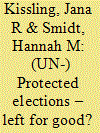

|
|
|
|
|
| Summary/Abstract |
How does the phased withdrawal of United Nations peacekeeping operations (PKOs) influence electoral violence? Many PKOs recently ended and peacekeeping personnel numbers are decreasing. Yet, research on peacekeepers’ exit remains in its infancy. We help fill this lacuna and examine how peacekeepers’ withdrawal affects violence during electoral periods. We focus on electoral periods because elections are both often-desired intervention endpoints and violence-prone moments in post-war trajectories. We argue that electoral violence increases shortly after a reduction in PKO troops because shortfalls in external oversight and security assistance reduce costs for organizing violence and open opportunities for pursuing a coercive electoral strategy. However, violence-inducing exit effects are likely short-lived due to adaptation by domestic security forces or peacekeepers who remain in the host country. We examine our argument across electoral periods and first-order administrative units of all African countries hosting a PKO (2001–2017). Controlling for violence trends prior to peacekeepers’ exit, two-way fixed effects models suggest that a local reduction in PKO troops is not associated with subsequent increases in electoral violence. However, withdrawal incidents lead to spikes in political violence more broadly defined. Our results confirm worries that downsizing during election times may endanger security gains in post-war countries.
|
|
|
|
|
|
|
|
|
|
|
|
|
|
|
|
| 2 |
ID:
186187


|
|
|
|
|
| Summary/Abstract |
How do voters want their governments to respond when another country unilaterally withdraws from an international institution? We distinguish between negotiation approaches that vary in the degree to which they accommodate the withdrawing state's demands and argue that negotiation preferences are shaped by two issues. The first is voters’ exposure to the costs and benefits of accommodation. This exposure varies across issues, and we argue that citizens will generally prefer non-accommodation on zero-sum issues, but support more accommodation on cooperation issues, where non-accommodation puts existing cooperation gains at risk. Second, withdrawal negotiations create precedents, and citizens should therefore be less willing to accommodate the more they are concerned about the ripple effects of accommodation on the institution's stability. These concerns also confront citizens with two types of dilemmas depending on how favorably they view the institution themselves. To test our argument, we use survey evidence and a conjoint experiment conducted in Germany and Spain during the Brexit negotiations. We find that respondents overall are more willing to accommodate the UK on cooperation issues than on zero-sum issues, but also find evidence that Euroskeptics and Europhiles confront different issue-specific dilemmas. Our paper contributes to a better understanding of the dynamics surrounding the challenges to multilateralism that have proliferated in recent years.
|
|
|
|
|
|
|
|
|
|
|
|
|
|
|
|
| 3 |
ID:
123044
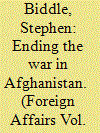

|
|
|
|
|
| Publication |
2013.
|
| Summary/Abstract |
International forces in Afghanistan are preparing to hand over responsibility for security to Afghan soldiers and police by the end of 2014. U.S. President Barack Obama has argued that battlefield successes since 2009 have enabled this transition and that with it, "this long war will come to a responsible end." But the war will not end in 2014. The U.S. role may end, in whole or in part, but the war will continue -- and its ultimate outcome is very much in doubt.
|
|
|
|
|
|
|
|
|
|
|
|
|
|
|
|
| 4 |
ID:
123374
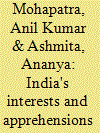

|
|
|
|
|
| Publication |
2013.
|
| Summary/Abstract |
The recently occurred India-linked ominous incidences like the Indian Consulate attack on 3rd August 2013(third of its kind since 2008) in the eastern city of Jalalabad or the killing of Sushmita Banerjee -the 'Kabuliwalar Bengali Bou' on 4th September 2013 in Sharan city of Afghanistan -despite the denial of its hand by Taliban, have exposed the vulnerability of India's people and interests in Afghanistan. India's growing popularity and trustworthiness among the people of Afghanistan these days has been overshadowed by the militant outfits active in Afghanistan, and the interplay of vested interests operating outside its frontiers; and this has become one of the chief concerns of India's foreign policy in the region in the wake of the withdrawal of the US-NATO forces from Afghanistan in mid-2014.
|
|
|
|
|
|
|
|
|
|
|
|
|
|
|
|
| 5 |
ID:
113602
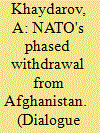

|
|
|
| 6 |
ID:
097173


|
|
|
| 7 |
ID:
127939


|
|
|
|
|
| Publication |
2014.
|
| Summary/Abstract |
Israeli Prime Minister Ariel Sharon's unilateral disengagement from the Gaza Strip was a pivotal event not only in the development of the Israeli-Palestinian conflict, but also in Israel's domestic political discourse. Yet the act of withdrawal, which is seen by some in Israel as a misguided attempt to advance peace, or at least separation, is interpreted very differently abroad. This article evaluates the various narratives that emerged about the motives for disengagement, seeking to understand why diverging narratives arose. It also addresses broader theoretical questions about the use of unilateralism, particularly in the context of conflict resolution.
|
|
|
|
|
|
|
|
|
|
|
|
|
|
|
|
| 8 |
ID:
171787
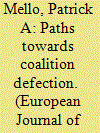

|
|
|
|
|
| Summary/Abstract |
Despite widespread public opposition to the Iraq War, numerous democracies joined the US-led multinational force. However, while some stayed until the end of coalition operations, and several increased their deployments over time, others left unilaterally. How to explain this variation? While some studies suggest that democratic defection from security commitments is primarily motivated by electoral incentives or leadership change, scholars have not reached a consensus on this issue. To account for the complex interplay between causal factors, this article develops an integrative theoretical framework, using fuzzy-set Qualitative Comparative Analysis (QCA) on original data on the Iraq War involvement of 51 leaders from 29 democracies. The findings document the existence of multiple paths towards coalition defection. Among others, the results show that: (1) leadership change led to early withdrawal only when combined with leftist partisanship and the absence of upcoming elections; (2) casualties and coalition commitment played a larger role than previously assumed; and (3) coalition defection often occurred under the same leaders who had made the initial decision to deploy to Iraq, and who did not face elections when they made their withdrawal announcements.
|
|
|
|
|
|
|
|
|
|
|
|
|
|
|
|
| 9 |
ID:
086020
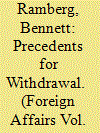

|
|
|
|
|
| Publication |
2009.
|
| Summary/Abstract |
In November 2008, the governments of the United States and Iraq agreed that U.S. troops would leave Iraq by 2011 -- eight years after the U.S. invasion. For some, this is much too soon. These critics argue that events on the ground, not an artificial deadline, should govern the pullout and that, in any case, a residual force should remain for decades.But as Washington ponders how long to stay in Iraq, it would do well to examine the strategic impact of the United States' withdrawal from other conflict-riven countries: Vietnam and Cambodia in the 1970s, Lebanon in the 1980s, and Somalia in the 1990s. Even though Washington's commitment to these situations differed in its degree, disengagement eventually proved to be the right policy for the United States. Abandonment damaged Washington's credibility at first, but it was the best way to protect U.S. interests in the long run. The dominoes did not fall after the United States left Southeast Asia; Moscow did not fill the power vacuum in Lebanon; Washington has been largely unaffected by the failed state of Somalia. In each case, after the United States exited, its adversaries became preoccupied with consolidating power and embroiled themselves in conflicts with neighboring countries. A regional stability of sorts emerged, leaving Washington's vital interests intact. For
|
|
|
|
|
|
|
|
|
|
|
|
|
|
|
|
| 10 |
ID:
177994
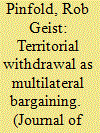

|
|
|
|
|
| Summary/Abstract |
This essay tests competing scholarly approaches to territorial withdrawal in two cases seldom scrutinised by theorists: the Israeli exits from the Gaza Strip and southern Lebanon. The dominant framing of these cases as ‘unilateral’ suggests Israel withdrew without bargaining with actors in the international system. These cases therefore apparently illustrate the primacy of domestic politics in facilitating or precluding withdrawal. Yet, this essay delineates often-overlooked causal paths emanating from: (1) violent Israeli bargaining with the enemy and (2) diplomatic Israeli bargaining with third parties. Hence, this essay demonstrates withdrawal is dependent on bargaining with external actors, even in ‘unilateral’ cases.
|
|
|
|
|
|
|
|
|
|
|
|
|
|
|
|
| 11 |
ID:
127419


|
|
|
|
|
|
|
|